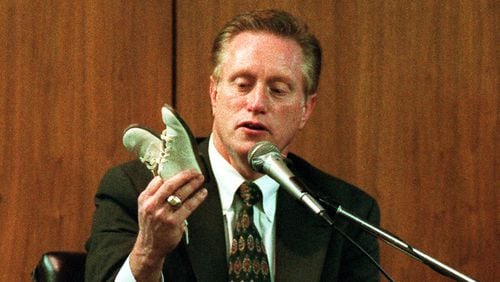As metro Atlanta's top medical examiner for decades, Joe Burton helped solve thousands of homicides, bringing closure to grieving families and justice to those criminally responsible. On Wednesday, a contrite and gaunt Burton received his own justice in an 8-year prison sentence handed down by a judge who couldn't fathom how far he'd fallen.
U.S. District Judge Eleanor Ross, once a homicide prosecutor herself, thanked Burton for the work he’d done for families who’ve suffered. “But I don’t think any of us can understand how you got here,” Ross told Burton as he stood before her.
Burton is now headed to federal prison for trading hundreds of opioid painkiller prescriptions for sexual favors. Last year, the 73-year-old former ME was arrested and charged in a scheme in which, over a two-year period beginning in July 2015, he wrote more than 1,500 prescriptions to 350 people for controlled substances.
Prosecutors said that about 60 percent of the prescriptions were for oxycodone pills, the street value of which was more than $2 million.
“I regret all that I’ve done is bad,” Burton, appearing somewhat disoriented, told Ross. “I don’t know why I did that. But I did. … I apologize to all the people here and the people of Georgia who I served as medical examiner since 1972. I failed everybody.”
Burton, a forensic pathologist, once served as chief medical examiner in Clayton, Cobb, DeKalb, Gwinnett and Paulding counties and as associate medical examiner in Fulton County. In May, he pleaded guilty to conspiring to sell controlled substances without a legitimate medical purpose.
In court motions, prosecutors had initially asked Ross to sentence Burton to 20 years in prison. But after Ross made several rulings during the five-hour-long hearing, Assistant U.S. Attorney John DeGenova asked for a 14-year prison term.
“The nature and circumstances of this offense are egregious,” DeGenova told Ross. “His actions are a disgrace to the medical community.”
DeGenova introduced evidence that showed a 31-year-old woman had died in December 2016 just three days after Burton gave her a prescription for oxycodone. The autopsy report showed she’d died of an overdose caused by both oxycodone and methamphetamine.
Burton’s lawyer, Buddy Parker, asked Ross to give Burton a greatly reduced sentence based on his diminished mental capacity, largely caused by a stroke in 2010. This severely harmed the right frontal lobe of Burton’s brain and robbed him of his executive function.
“That frontal lobe is fried,” Parker said, citing medical reports that show the lobe has shrunk and is continuing to shrink. “He did what he did because he couldn’t control himself.”
In an emotional plea, Parker said the fragility of the human condition is one reason why Burton was in court for sentencing.
“This man did the right thing for over 40 years,” Parker said. “Then he went off the rails.”
But Ross did not grant Parker’s motion. She cited prosecution testimony that disclosed Burton had been writing illegal prescriptions for opioids before his stroke. Prosecutors also noted that Burton had been a serial philanderer long before his brain functions were compromised.
After he retired from public service and became an expert witness, Burton traveled to various cities and closed down strip clubs after drinking prodigious amounts of booze, prosecutors said. At one point, Burton hired a former stripper to come work for him and, even though co-workers said she did nothing, he paid her $10,000 a month and bought her a condo and a Mercedes.
The federal sentencing guidelines, which were once mandatory but are no longer, called for Ross to give Burton a term as low as 12 years and seven months in prison to as high as 15 years and eight months in custody.
Parker asked Ross to go far below that — a sentence of three years and eight months.
“He lost his medical license,” Parker said. “He lost his practice. He lost his reputation as one of the greatest pathologists in the country.”
Moreover, Parker said, “there is no long term” for Burton because his health is deteriorating, and for this reason he asked Ross to send Burton to the Federal Medical Center, a Butner, N.C., prison for inmates needing medical care.
“He can’t take care of himself,” Parker said. “He really can’t.”
Ross, expressing sadness for Burton’s criminal conduct and praising his past for the “quality of work you’ve done,” ultimately decided on a middle ground.
About the Author








